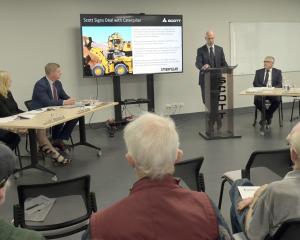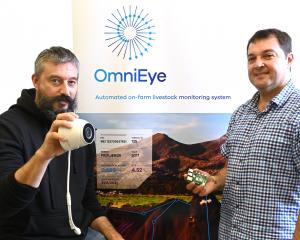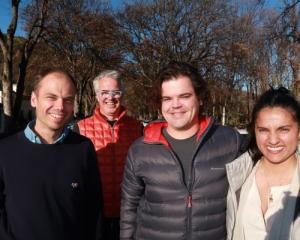If you think opponents of the Trans Pacific Partnership are typically anti-free trade/anti-globalisation conspiracy theorists, consider these unlikely bedfellows: librarians, software exporters, researchers, book lovers, fans of DVDs, media creatives and people who download music.
The negotiations for a trade deal covering 11 Pacific nations have managed to unite these apparently unconnected sectors in alarm. Most likely, they include you and me - everything and everyone is connected in the digital age.
The United States' wish list for the agreement includes a tighter regulatory regime for intellectual property (chiefly copyright and patent laws), which interest groups say could tie them - and us - in a dense legal web, affecting everything from our use of the internet and access to music, books and films to the fast-growing software development sector.
How real are the fears? With the negotiations cloaked in secrecy, we won't know until the deal is too far advanced to unpick. Unless our negotiators (and those of the other participants) can stare down the US position, there are fears IP freedoms could be sacrificed for our overriding goal of improved access for dairy and meat products to US markets.
This could usher in a litigious environment of alleged patent and copyright violations - the kind which, in the US, is notorious for thwarting innovation, stifling competition and making patent lawyers rich.
Parallel importing is in the firing line, according to the leaked draft of the US position. This could affect not just knock-off copies but our freedom to source licensed brands without the premium charged by licensees.
Apart from the damage to our Christmas shopping budgets, the Libraries Association says a ban on parallel imports would slow down access to new-release books in libraries. A longer copyright length would restrict what libraries are able to digitise.
They could be prevented from overriding technological protection measures such as zone restrictions on DVDs. Users of iPhones and iPads may risk fines for ''jailbreaking'' devices to add non-licensed functions. Longer copyright periods would narrow the options for musicians and media creatives.
Internet and copyright law specialist Rick Shera is concerned about proposals to increase powers to prosecute and penalties - up to $US150,000 ($NZ180,000) per infringement.
''There have been cases in the US where housewives have been sued over [downloading] five to 10 songs,'' says Shera.
''You could end up with an iPod with $4 million of infringements on it, as rights holders are able to seek a multiple of the damages suffered.''
The film and music industries, which are driving the US goals on IP, want internet service providers (ISPs) to monitor internet activity for copyright breaches at their own expense and to pass on alleged abusers' names to rights holders, says Shera.
Telecommunications Users Association chief executive Paul Brislen says the huge monitoring costs would be passed to consumers.
''If ISPs are required to filter stuff or block websites, it's the consumer who pays at the end of the day. It will lead to things like deep pocket inspections [filtering] of everybody's content which will slow down the internet and raises privacy issues. ISPs risk being sued for the behaviour of their customers - it becomes quite laughable.
You get lawyers claiming to represent rights holders and demanding take-downs for content they don't have any rights to or clients they don't represent. It's the kind of nonsense that only the American legal system engages in.''
The devil is in the detail - and it quickly descends into terminology that only trade treaty specialists and techno geeks can decipher. Susan Chalmers is policy lead for Internet New Zealand and spokeswoman for Fair Deal, a coalition of the interest groups. She believes that the draft US position threatens the very workings of the internet, for instance by challenging the right to store copied material, known as caching.
''The internet works by making temporary copies, or `transient reproductions', of data in order to transmit it from point A to point B,'' says Chalmers.
''The US proposals threaten the exception [in copyright law] that ensures that copyright owners don't abuse their power by suing anyone who intentionally or unintentionally makes a temporary copy.
This area is so fundamental to our use of the internet that observers such as Shera pick it as a stalking horse - the equivalent of the opening price at an Asian bazaar. But the IP chapter for the agreement is so detailed - over 1000 pages - there's a risk clauses will slip through which have unintended consequences, Shera says.
''There's a huge amount of complexity in this. When it reaches the select committee, it will be too late for the public to change things. It would pay to get as many people to have a look before [the public release] as possible.''
Don Christie of open source software specialist Catalyst IT, says ISPs will tend to take a precautionary approach.
''Rather than going through a process of taking you to court and giving you a chance to defend yourself they will tend to act first [cutting service] and ask questions later. It's the criminalisation of very natural activities on computers and the internet, with the risk of fines that far exceed the value of what's allegedly being copied.
''It has a huge chilling effect on activity and innovation and greatly increases the cost of doing business.''
A government reversal in its reform of patent laws has only heightened fears, suggesting to many tech firms that the TPP process is already shackling the sector, which employs 28,000. Until August, software was set to be excluded from patenting, a boon to firms who build on existing software and data to develop new applications and packages.
But after lobbying from Microsoft and other US tech giants - both directly and through the TPP talks - Commerce Minister Craig Voss tabled changes which critics say will ensnare our software development firms in the world of patent disputes.
Institute of IT Professionals chief executive Paul Matthews says software that builds on previous concepts and developers always runs the risk that someone has patented something they are doing.
''In the US, companies have managed to patent some pretty obvious generic things and spend their time going after tech companies. It's difficult to develop product without becoming a target of patent trolls [lawyers and legal firms who buy up patents in the hope of making money].''
New Zealand's biggest software exporter, Orion Health, fears having to change the nature of its business.
''Most new software ideas have minimal originality and little investment and so it makes absolutely no sense to afford software the same patent protection as a new drug,'' says chief executive Ian McCrae.
Of course, there are strong arguments in support of the US stance - as basic as if you're not doing anything illegal there's nothing to fear. But that's not the reality in the US, where established players routinely use litigation to delay competition and discourage innovation.
In an opinion piece in October, Stephen Jacobi, executive director of the NZ US Council, emphasised that the TPP is a negotiation - and the US position could be taken as the ''art of the possible''.
''No-one wants to see prices go up or the internet collapse.''
Wish list
Interest groups' key concerns over leaked draft of US IP chapter:
• Extension of copyright terms, e.g., from 50 to 70 years for books after author's death.
• Clampdown on exceptions to copyright rules, e.g., ''fair use'' provisions.
• Patents on software (New Zealand has already reversed its plan to exclude software in review of patent law).
• Parallel imports subject to veto.
• Internet service providers responsible for monitoring and policing. Rights holders can insist on removal of material.
• Offence to circumvent technological protection measures (e.g., region codes on DVDs, technology locks on iPhones).












